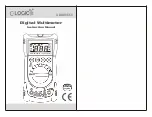
SW-Stahl und Werkzeugvertriebs GmbH
Tel. +49 (0) 2191 / 46438-0
F
5
6
e
s
s
a
r t
S
r
e
s
u
k
r
e
v
e
L
ax +49 (0) 2191 / 46438-40
e
d . l h
a t s
w
s
@
o
f
n i : l i
d i e
h
c
s
m
e
R
7
9
8
2
4 -
D
Ins
truc
tion
M
anua
l
BGS technic KG
Bandwirkerstr. 3
D-42929 Wermelskirchen
Tel.: 02196 720480
Fax.: 02196 7204820
[email protected]
www.bgstechnic.com
WARNING AND PRECAUTIONS
Use the Meter only as specified in this manual, otherwise the protection provided by the Meter may be
impaired. In this manual, a Warning identifies conditions and actions that pose hazards to the user.
A Caution identifies conditions and actions that may damage the Meter or the equipment under test.
To avoid possible electric shock or personal injury, and to avoid possible damage to the meter or to
the equipment under test, comply with the follow practices:
•
Do not use the meter if it is damaged. Before you use the meter, inspect the case. Pay particular
attention to the insulation surrounding the connectors.
•
Inspect the test leads for damaged insulation or exposed metal. Check the test leads for
continuity. Replace damaged test leads before you use the meter.
•
Do not use the meter if it operates abnormally. Protection may be impaired. When in doubt,
have the meter serviced.
•
Do not operate the meter around explosive gas, vapor, or dust.
•
Do not apply more than the rated voltage, as marked on the meter, between terminals or
between any terminal and earth ground.
•
Before use, verify the meter’s operation by measuring a known voltage.
•
When measuring current, turn off circuit power before connecting the meter in the circuit.
•
When servicing the meter, use only specified replacement parts. Do not use the Meter in a
manner not specified by this manual, or the safety features of the Meter may be impaired.
•
Use with caution when working above 30V ac rms, 42V peak, or 60V dc. Such voltages pose a
shock hazard.
•
When using the probes, keep your fingers behind the finger guards on the probes.
•
Connect the common test lead before you connect the live test lead. When you disconnect test
leads, disconnect the live test lead first.
•
Remove the test leads from the meter before you open the battery door.
•
Do not operate the meter with the battery door or portions of the cover removed or loosened.
•
To avoid false readings, which could lead to possible electric shock or personal injury, replace
the batteries as soon as the low battery indicator (“ ”) appears.
•
Safety Compliance: EN61010-1, 2000 CAT II 600V overvoltage standards. Do not measure
voltages above 600V in Category II installations.
Overvoltage installation categories per EN61010-1, 2000: The Meter is designed to protect against
transients in these categories:
•
CAT I >From high-voltage low-energy sources, e.g., electronic circuits or a copy machine.
•
CAT II >From equipment supplied from the fixed installation, e.g., TVs, PCs, portable tools and
household appliances.
GENERAL SPECIFICATIONS
•
Maximum Voltage between any Terminal and Earth Ground: 600V
•
Measurement rate: updates 2-3/sec.
•
Over range indication: “1” figure only in the display
•
Automatic negative polarity indication.
•
The “ ” is displayed when the battery voltage drops below the operating voltage.
•
Operating temperature: 10°C~40°C, 0~75% R.H.
•
Storage temperature: -10°C~50°C, 0~75% R.H.
•
Power: 2x 1.5V AAA battery
•
Dimensions: length 126 x width 70 x height 24 mm
•
Weight: approx. 140g (including battery)
•
Accuracies are guaranteed for 1 year. Measured at 23°C ± 5°C less than 80% relative humidity.







































